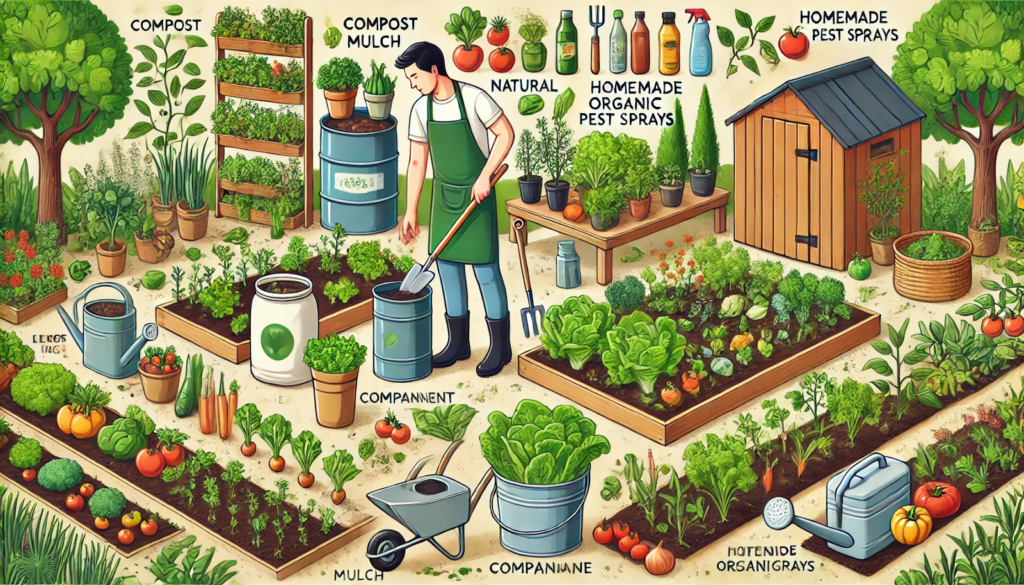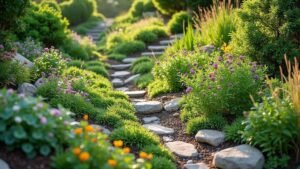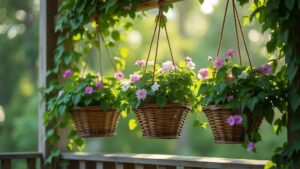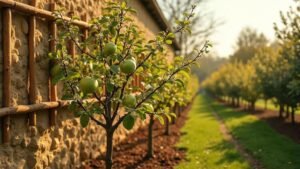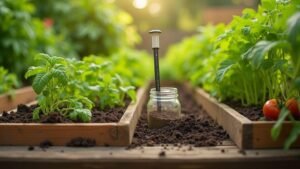Growing your own food without chemicals is a rewarding and healthy way to garden. By avoiding synthetic fertilizers and pesticides, you protect the environment, support biodiversity, and ensure that your fruits and vegetables are safe for you and your family to eat.
In this guide, you’ll learn how to grow a productive garden using 100% natural methods—from soil health to pest control.
1. Start with Organic, Nutrient-Rich Soil
Healthy soil is the foundation of a chemical-free garden.
How to Build It:
- Use compost made from food scraps, leaves, and yard waste
- Add aged manure from herbivores (cow, horse, chicken)
- Mix in worm castings for microbial life and nutrients
- Use natural mulch (straw, leaves) to retain moisture and suppress weeds
Avoid bagged soil mixes with synthetic additives or chemical fertilizers.
2. Choose the Right Plants for Your Climate
When you grow plants suited to your region, they’re more likely to thrive without chemicals.
What to Consider:
- Native or locally adapted plants
- Heirloom and organic seed varieties
- Disease-resistant cultivars (marked on seed packets)
Healthy plants grown in the right environment require fewer interventions.
3. Use Crop Rotation to Maintain Soil Health
Rotating crops helps balance nutrients and reduces the spread of soil-borne diseases.
Example Rotation:
- Year 1: Tomatoes and peppers (heavy feeders)
- Year 2: Carrots and beets (root crops)
- Year 3: Beans and peas (nitrogen-fixing legumes)
- Year 4: Leafy greens and herbs (light feeders)
Keep notes to track what you’ve grown in each bed.
4. Companion Planting for Natural Pest Control
Some plant combinations protect each other from pests and disease naturally.
Powerful Pairings:
- Basil with tomatoes (repels aphids and hornworms)
- Marigolds with most vegetables (deters nematodes and beetles)
- Garlic with lettuce (repels slugs)
- Nasturtiums near cucumbers (trap pests)
Companion planting also boosts pollination and soil health.
5. Water the Smart Way
Overwatering or underwatering weakens plants and makes them vulnerable to pests and disease.
Best Practices:
- Water early in the morning
- Use drip irrigation or soaker hoses to avoid wetting leaves
- Water deeply but less frequently
- Collect rainwater to reduce dependency on treated tap water
Healthy plants are more resistant to problems.
6. Control Pests with Natural Methods
Say no to chemical pesticides—nature offers safer, effective alternatives.
Organic Pest Control Tools:
- Neem oil spray – Controls aphids, mites, and caterpillars
- Insecticidal soap – For soft-bodied insects
- Garlic and chili spray – Homemade deterrent
- Diatomaceous earth – Natural powder that stops crawling insects
- Introduce ladybugs, lacewings, and hoverflies as beneficial predators
Inspect plants regularly and treat early.
7. Use Natural Fertilizers
Feed your plants with slow-release, organic nutrients.
Great Options:
- Compost tea
- Fish emulsion
- Seaweed extract
- Bone meal and blood meal
- Banana peel water (rich in potassium)
Apply based on plant growth stages and avoid over-fertilization.
8. Keep Weeds Down Without Chemicals
Weeds compete for water and nutrients—but can be managed naturally.
Weed Control Methods:
- Apply mulch to block sunlight
- Pull weeds by hand or with tools regularly
- Use vinegar spray on paths (avoid near veggies)
- Plant ground covers like clover or creeping thyme
Weed early and often before they go to seed.
9. Encourage Biodiversity
The more life in your garden, the more balance and resilience it has.
Additions That Help:
- Flowering plants to attract pollinators
- Insect hotels or bee houses
- Bird feeders and water sources
- Diverse crop selection to break pest cycles
Nature helps defend your garden when it’s welcomed in.
10. Be Patient and Consistent
Chemical-free gardening takes observation and care—but it’s worth it.
Tips for Success:
- Keep a garden journal to track what works
- Visit your garden daily, even for 5 minutes
- Make small adjustments rather than reacting drastically
- Celebrate every harvest, no matter how small
In time, your garden will become healthier and more self-sufficient.
Conclusion: Grow Naturally, Eat Safely
Growing food without chemicals isn’t just possible—it’s practical, affordable, and healthier for everyone. With the right techniques, you can enjoy clean, flavorful, and nutritious produce straight from your own garden, grown the way nature intended.
Plant with care, tend with love, and let nature reward your efforts.

